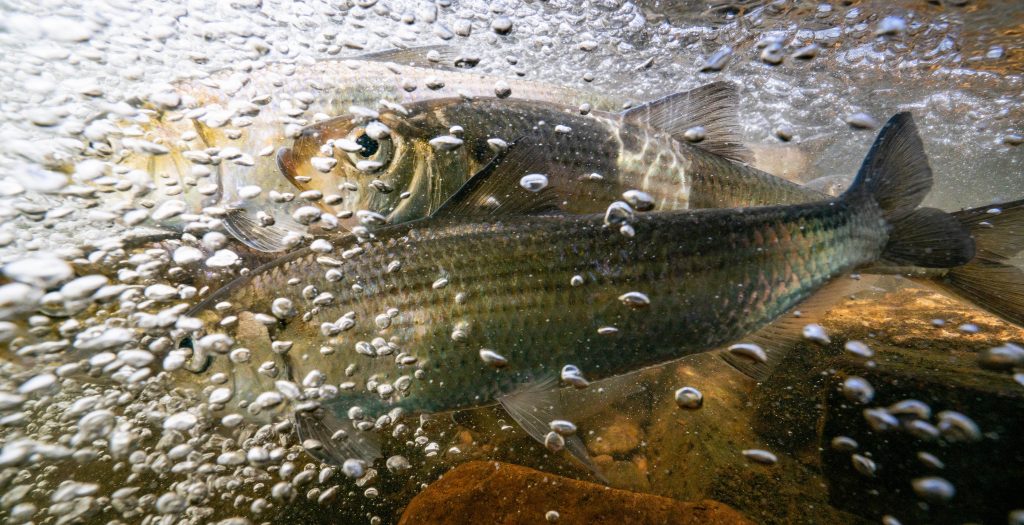Return of the River Herring

When an internationally roving sculpture named “Happy Fish” migrated to the Town Brook in April, WHOI Sea Grant’s Fisheries & Aquaculture Specialist – and famous river herring enthusiast – Abigail Archer was on hand to greet it.
“I love when art can be used to help people get excited about science and observing the natural world,” said Archer, who described the sculpture as “basically, a piece of metal bent into a squiggly shape.” She added, “Fish are and have been so important in human cultures – that squiggly shape of a fish is very powerful.”

Abigail Archer, front row, third from left, was on hand to greet Happy Fish, the guest of honor at the Plymouth Herring Festival in 2023.
Happy Fish, which travels around the world reminding folks of the importance of migratory fish, was the guest of honor at the Plymouth Herring Festival, where Archer was also on the “menu,” speaking to the 120 attendees about the fish tagging and passage research that she’s been a part of on Town Brook since 2006.
“It was a great crowd,” recalled Archer. “They clapped when I shared that, after the Newfield St dam was removed in 2019, the percentage of fish passing went from 24 to 94!” She also told them that one antenna is still in place on the river – electronically listening for any fish that were tagged in 2018 or 2019 and might return to the river.
From the tagging research, Archer and her colleagues know that six fish tagged in 2019 have returned to the river in 2020,’21 and ‘22. Every year the number of repeat spawners gets smaller and smaller, so Archer didn’t anticipate any returns this year, but in May, Archer and the study partners at Plymouth Department of Marine and Environmental Affairs were ecstatic to find that three fish were detected returning in 2023! If, in 2019, they were 3 years old, the age at which herring spawn, then they are now 7 years old – quite a feat for Massachusetts river herring!
This information is important because it can be added to other studies that estimate what percentage of the population returns to the river every year versus is eaten or dies at sea. Knowing how many fish return every year and their ages helps managers make decisions about how healthy the population is and if sustainable harvesting is possible.
As for Happy Fish, the migration continues. After weeks of touring fish passage sites in Massachusetts, Happy Fish is touring fish passage project sites in Rhode Island and Connecticut before heading down to New York and New Jersey at the end of May. In the late summer, Happy Fish will tour the Great Lakes and then it’s out to the West Coast for September.
» Check out Abigail Archer's Plymouth Herring Festival presentation
